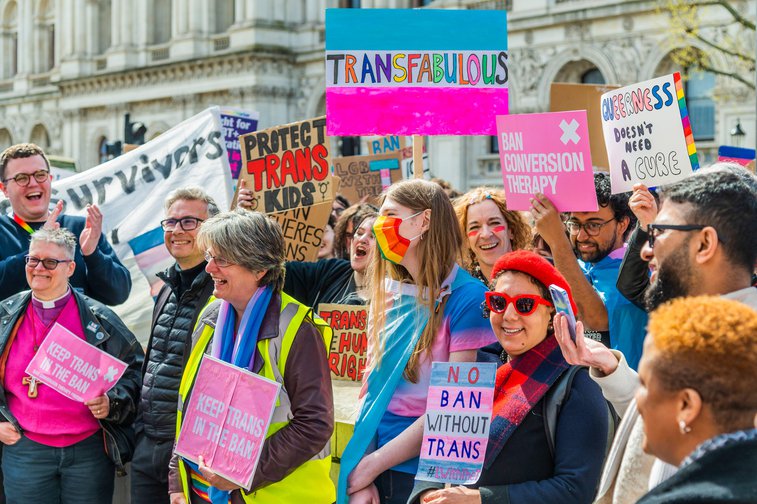A Brief Colonial History Of Ceylon(SriLanka)
Sri Lanka: One Island Two Nations
A Brief Colonial History Of Ceylon(SriLanka)
Sri Lanka: One Island Two Nations
(Full Story)
Search This Blog
Back to 500BC.
==========================
Thiranjala Weerasinghe sj.- One Island Two Nations
?????????????????????????????????????????????????Wednesday, April 13, 2022
Tories attacking trans rights to court transphobic voters, says ex-adviser
Boris Johnson’s U-turn over protecting trans people in the conversion therapy ban is an attempt to appeal to Tory heartlands, says Jayne Ozanne

Hundreds protested the government's U-turn on conversion therapy in Whitehall on 10 April
| Guy Bell / Alamy Stock Photo
Adam Bychawski-11 April 2022
Boris Johnson is attacking transgender people because he believes it appeals to Tory voters, a former LGBTQ government adviser has claimed.
The government has been condemned by LGBTQ rights groups for excluding transgender people from its ban on so-called conversion therapy.
Speaking to openDemocracy, Jayne Ozanne – a conversion therapy survivor and chair of the #BanConversionTherapy coalition – accused the government of making decisions on LGBTQ policy by what it believes appeals to its base.
“Number 10 thinks that its heartland Tory voters are anti-trans,” she said, “and I think that they are trying to appeal to their heartland at a time when they think that they are weak.”
Ministers had initially announced that the long-promised ban would be scrapped altogether before partially U-turning hours later, pledging to outlaw therapy that attempts to change somone’s sexual orientation, but not their gender identity.
‘Conversion therapy’ (also called ‘reparative therapy’ or ‘gay cure therapy’) refers to any therapeutic approach or view that assumes that one sexual orientation or gender identity is innately preferable to another, and attempts to change someone’s sexual orientation or gender identity on that basis. In practice, this means changing people’s orientation or identity to cis gender heterosexuality.
These attempts range from talking therapies – communicating a belief that someone’s sexual orientation or gender identity is wrong, disordered or ‘sinful’ – to physical violence, including beatings and so-called ‘corrective rape’.
The practice is viewed as harmful and ineffective by medical professionals and human rights defenders, and is already banned in over 16 countries worldwide.
Ozanne was one of three members of the government’s LGBTQ advisory panel who resigned in March 2021, saying that at the time that she was “astonished at how ignorant” its equalities ministers were.
The government disbanded the panel, which was formed under Theresa May’s government, the following month.
On Wednesday, ministers were forced to cancel the UK’s first-ever official international LGBTQ conference after a boycott by more than 100 organisations.
“The prime minister is picking on one of the most vulnerable and misunderstood communities,” she told openDemocracy.
“As the person in power, the prime minister’s primary role in my mind is to protect the most vulnerable in his society. Instead, he piles on the myths, and the fears, and does the very opposite.”
The Conservative Party promised to end conversion therapy in 2018. In October, the equalities minister Liz Truss, who drafted the original policy on the ban, affirmed that “there should be no place for the abhorrent practice”.
“I was shocked by the partial U-turn because that showed me that the ‘gender critical’ lobby have, frankly, got the ear of the prime minister far more than the medical experts and indeed his own ministers have,” said Ozanne.
Last week, openDemocracy revealed that ministers met with groups campaigning against trans rights ahead of the decision to drop the ban.
The government’s partial U-turn prompted the resignation of its LGBTQ business champion Ian Anderson, who said excluding transgender people from the ban was divisive.
“For all this to have happened on the International Transgender Day of Visibility and in the week when the first trans MP felt able to speak about his own difficult journey was profoundly shocking,” he wrote in his resignation letter.
An official briefing that was leaked last week advised that the government should time its announcement on dropping the pledge with this year’s Queen’s Speech in May to “reduce the risk of looking like we have singled out an LBGT issue”.
Officials acknowledged that the change in policy would signal to the LGBT community that the government is “uninterested in LGBT issues”.
And the document warned that there would be a “noisy backlash from LGBT groups and some parliamentarians when we announce we do not intend to proceed”.
Johnson has faced a backlash from his own MPs over the decision to renege on the ban.
The Tory MP Dehenna Davison, who publicly came out as bisexual in October, said that the government had broken “an explicit promise”.
“This is a matter of basic decency. Being gay is not something that needs curing,” she said on Twitter.

%20(2)%20(2)%20(1).png)